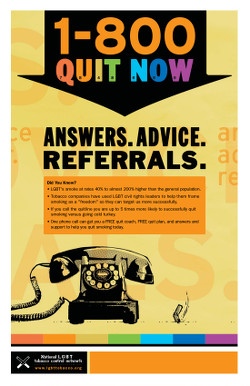BY AJ TRAGER

The anti-smoking character CiggyButtz stands where all other cigarettes must outside of the nonsmoking San Francisco LGBT Community Center. The Center received an award for leadership in rejecting tobacco industry funding during the opening of the California LBGT Tobacco Education Partnership.
MICHIGAN – A recent study by Affirmations Community Center and the Kalamazoo Gay and Lesbian Resource Center, funded by the Michigan Department of Community Health (MDCH), facilitated eight focus groups with LGBT-identified individuals that helps shed light on tobacco use within the LGBT community.
The study looked at three main objectives: behavior and attitudes regarding tobacco use, tobacco use cessation and awareness of tobacco use campaigns and media messages. Participants were asked to evaluate the effectiveness of ads from the Truth Campaign, CDC Tips from Former Smokers and The Bill DeFrank LGBT Center and the LGBT Center Orange County, both based in California. Echoing national findings, most participants in this study initiated tobacco use before the age of 18 and nearly every participant reported a desire to quit or have attempted quitting during their smoking history.
Cigarette smoking is the leading cause of preventable disease and death in the United States, according to the U.S. Department of Health and Human Services. The American Lung Association reports that gay and bisexual men are 27 to 71 percent more likely than their straight counterparts to be tobacco users and lesbian and bisexual women are 70 to 350 percent more likely than their straight counterparts to use tobacco.
Health
"Lung cancer is 33 percent of every cancer out there. If smoking disappeared from this planet, 33 percent of cancer would disappear as well. And it has more relationship with diabetes, surgeon generals report. Who knows, as we research more, what we might find out," said Director of LGBT HealthLink and an Adjunct Assistant Clinical Professor at Boston University School of Public Health, Dr. Scout.
LGBT HealthLink: Network for Health Equity 2013 shows that one third of LGBT people smoke cigarettes. That rate is nationally 68 percent higher than the general population. But simultaneously, the tobacco companies continually target LGBT communities by donating to LGBT causes and offer an undisclosed amount of financial support to LGBT festivals, bars, media and local organizations.
Smoking has often been used as a way to deal with stress, especially for lower income families and people with mental health problems. Smoking is a quick and easy way to take the edge off. But health concerns with the inhalant are substantial. There is tightness in the chest, loss of a sense of smell and effects on the metabolism. Micro abrasions in the esophagus can also occur as well a provide as a trigger for depressive episodes or emotions.
"Studies suggest LGBT people have a higher risk for cardiovascular disease and diabetes because of higher tobacco use and stress. Stress alone has so many immunological effects on the body because of endocrine risks. LGBT youth take longer to smoke, but they take to it for longer once they start. It's related to minority stress. They use tobacco as a coping mechanism," said Program Coordinator for National LGBT Cancer Network, Michael Bare. "When people talk about cancer, they talk about it in a care continuum: prevention, screening, diagnoses, treatment and end of life treatments."
Smoking is a socially transmitted disease. Individuals with family members that smoke are significantly more likely to begin smoking at some point in their lifetime. Smoking at bars and night clubs is also a big part of what gets people interested in the drug; they see a group interacting and want to be a part. Smoking has been proven to be an easy social conversation starter.
"We find that lots of people are smoking and pass it along to the next generation. If you are a smoker, try not to smoke with other people. Give your community a gift," Scout said. "You can have the young queer people smoking and they say, 'It seems fine, what is the issue? Of course we know it's freaking toxic.'"
Targets For The Tobacco Industry
Tobacco companies and cancer departments look at national surveys to see which demographics are using their products most. The tobacco industry spends $40 million per day exporting its advertisement legacy. And Scout says that up to 60 percent of legislators are taking tobacco money. So why isn't there effective prevention legislation?
"They have targeted us. It has been a little more covert recently. They have ways of advertising in our magazines. Their marketing has become quieter because they capture their information in a gay bar, scan drivers licenses and then you get things sent to your house. A lot of advertisements are tailored and costumed," Scout said.
The Michigan study found that tobacco campaigns were seen as more effective when presented by counterculture or insiders of the LGBT community and was extended to musical acts or celebrity figures that were considered to be part of counterculture. Anti-smoking messages from LGBT identified artists and performers such as Tegan and Sara and RuPaul had a powerful impact.
Participants in the study were less receptive to ads sponsored by governmental agencies and more receptive to ads sponsored by LGBT organizations. They were also more entranced by ads that reflected the diversity of the LGBT community and portrayed individuals in healthy and empowering environments. Highly sexualized images were seen as ineffective and offensive and participants asked for a focus on morbidity rather than morality.

Changing The Conversation
"The first thing I always say is you have to collect the data. The next step is to do it routinely for the state surveillance work," Scout said. "What we know right now is that the information still shows that smoking rates are incredibly high. They are so high that smoking disparities are going to rise for decades to come."
Michigan is doing the data collection, but it is now up to the residents to continue to make the progress. Scout suggests coming together to train "tobacco quit lines" to be LGBT friendly and to have custom advertising on the street, funding disparity networks to work on continuing outreach and teach youth that smoking is not a healthy life choice.
"The more our state puts resources towards this, the more we will understand this is a huge burden for us. For HIV, the money has come down in a lot of different ways. Tobacco should be just as robust. The type of programming we see in every one of our organizations, we should be seeing ads all over the place. We should see that this is a big issue," Scout said.
It isn't about vilifying smokers; they are the ones who need the most support. Trying to quit tobacco is extremely difficult. It requires a lot of community support sometimes to help someone get out of the cycle and break the habit.
Earlier this year Scout trained staff at National Jewish Health, the vendor that runs the Michigan Tobacco Quit Line. Scout and staff at Affirmations and MDCH have worked to assess the cultural competency of the Quit Line over the past year and found that the vendor does in fact use the best national practices in collecting sexual orientation and gender identity information in counseling LGBT populations. Affirmations has led the push in the state to advance tobacco prevention programs for LGBT communities by educating state legislators on the need for more funding, promoting the Quit Line and producing studies like the one conducted last year.
In the upcoming years the center will make simple media and tobacco sensation ads based off of recommendations of the focus groups, disseminate the study's findings to the community and policy makers and continue to connect people to tobacco cessation resources.
"We're excited and hopeful as we move into an era were people have more and more access to healthcare and individuals have the support that they need to quit. It gets us a lot a farther than a picture of a tracheotomy on a pack of cigarettes," said Lydia Ahlum Hanson, health and wellness manager at Affirmations.










